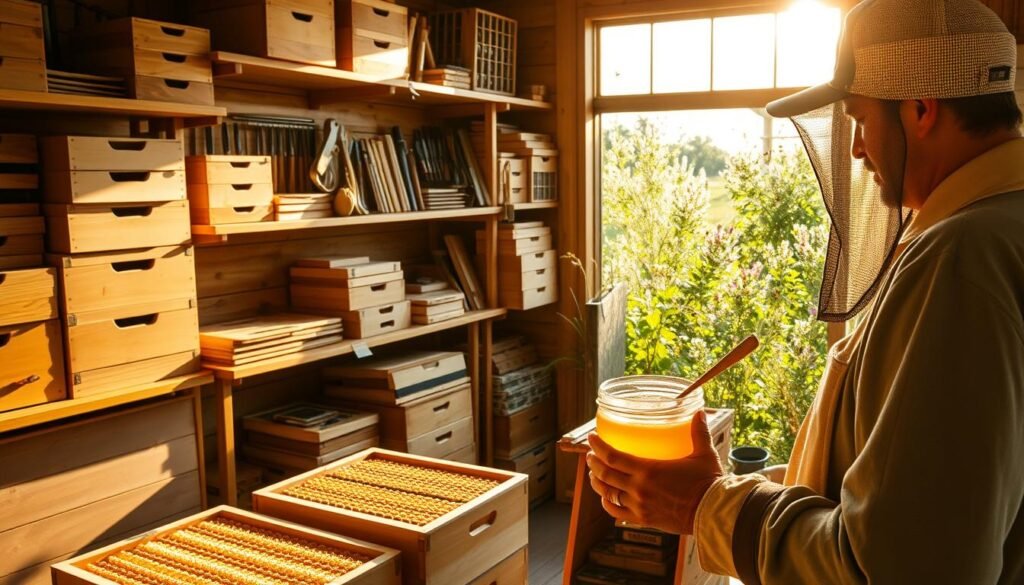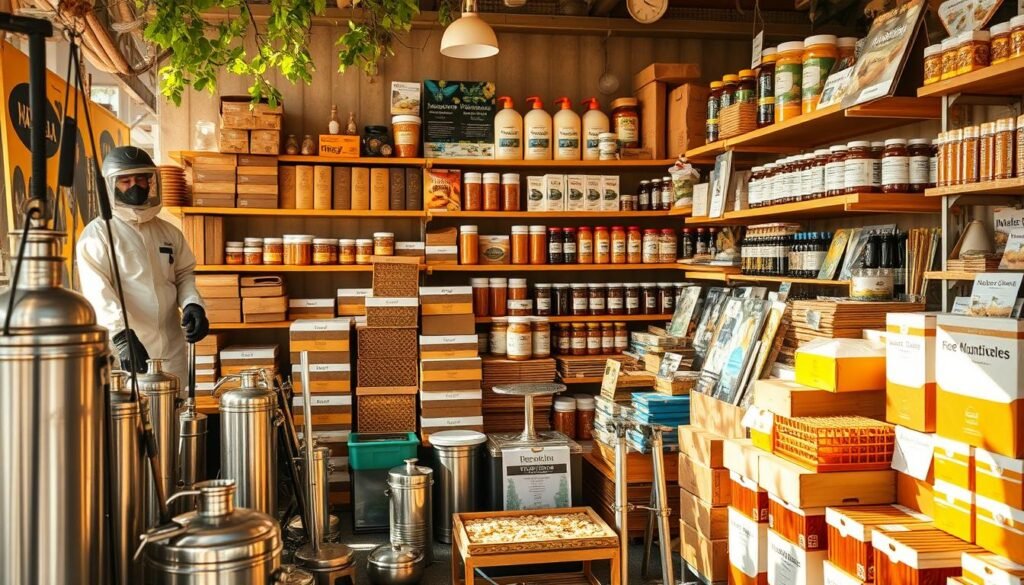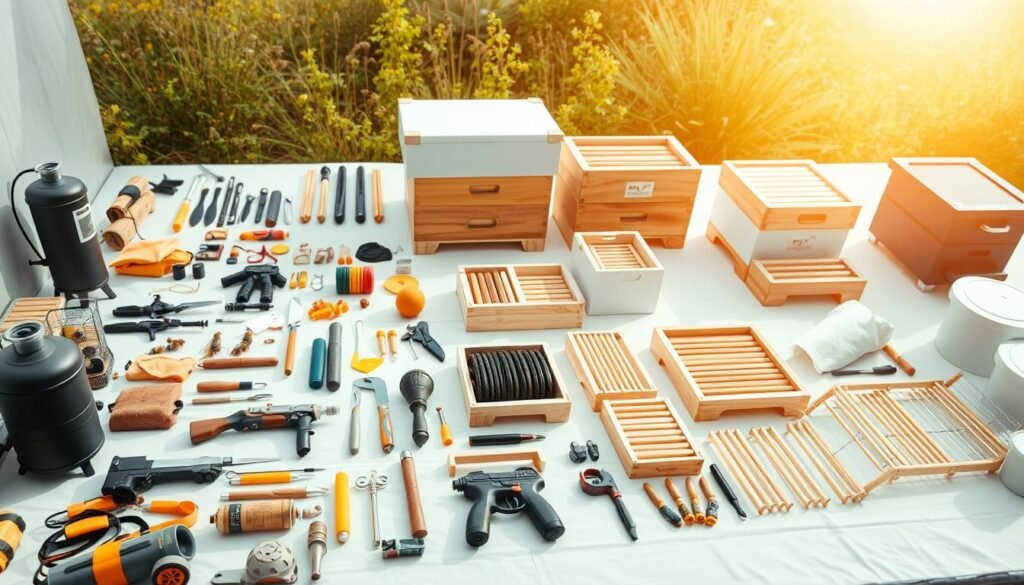Western Australia’s capital is home to a vibrant community passionate about sustainable practices and environmental stewardship. With its Mediterranean climate and diverse plant life, the region creates perfect conditions for pollinators to thrive. Local experts have spent decades refining methods that balance tradition with innovation, ensuring both productivity and ecological health.
Businesses like The House of Honey in Swan Valley offer hands-on workshops, sharing knowledge accumulated over 50 years. Whether you’re curious about harvesting golden honey or supporting native species, these experiences cater to all skill levels. Suppliers such as Beewise and Guilfoyles reinforce this ecosystem, providing locally made equipment and ethically sourced materials.
Engaging with these services doesn’t just teach practical skills—it fosters a deeper connection to the environment. Many programs emphasise conservation, helping participants understand the delicate balance required to protect vital pollinators. This approach ensures that every hive contributes to broader biodiversity goals while delivering premium products.
Key Takeaways
- Western Australia’s climate supports year-round pollinator activity
- Local providers offer decades of expertise in sustainable practices
- Hands-on workshops cater to beginners and seasoned enthusiasts
- Ethically sourced equipment strengthens regional ecosystems
- Conservation-focused programs align with biodiversity targets
Introduction to the Vibrant World of Bees in Perth
Pollinators form the backbone of Western Australia’s thriving natural landscapes. These tiny workers maintain flower diversity and agricultural productivity through their daily activities. Local initiatives blend ecological awareness with practical solutions, creating spaces where nature and human effort coexist harmoniously.
Importance of Bees to Local Ecosystems
Over 75% of flowering plants depend on animal pollinators to reproduce. In urban and rural areas alike, these insects ensure food supplies for wildlife and people. Native species like stingless varieties work alongside European honey producers, each filling unique ecological roles.
| Pollinator Type | Key Contribution | Conservation Status |
|---|---|---|
| Native Stingless | Specialised plant pollination | Protected species |
| European Honey | Large-scale food crop support | Managed populations |
| Solitary Species | Wildflower maintenance | Research focus areas |
An Overview of Perth’s Bee Culture
The House of Honey leads sustainable practices with sanctuaries that prioritise insect welfare. Their approach demonstrates how commercial operations can support wild colonies through:
- Chemical-free hive management
- Seasonal flowering calendars
- Community education programs
Workshops teach residents to create backyard habitats using native plants. This movement helps combat habitat loss while producing premium honey varieties. Seasonal changes guide harvesting schedules, ensuring colonies maintain strength year-round.
bees perth: Local Service and Beekeeping Solutions
The demand for sustainable practices has spurred a rise in customised apiculture services across the region. Specialists like Beewise design equipment that simplifies hive management while boosting productivity. Their workshops craft durable tools suited to Australia’s climate, helping enthusiasts protect colonies and harvest premium products efficiently.
Expert Services for Native Bee Enthusiasts
Seasoned professionals offer guidance on habitat creation and species-specific care. Beginners receive starter kits with protective gear and hive components, while advanced apiarists access modular systems for large-scale operations. Custom designs address challenges like limited urban spaces or unique floral sources.
Tailored Beekeeping Solutions for All Levels
Local providers deliver solutions matching distinct needs:
- Beginner-friendly mentoring programs with hands-on training
- Smart sensors tracking hive conditions via mobile apps
- Eco-friendly materials ensuring colony safety
Regular maintenance plans help beekeepers prevent diseases and optimise honey yields. Partnerships with manufacturers guarantee access to innovations like ergonomic extractors and insulated nesting boxes.
Exploring Native Bees and Their Role in the Ecosystem
Over 2,000 species of native pollinators work silently to sustain Western Australia’s unique flora. Educational programs reveal how these insects maintain delicate ecological balances through specialised pollination patterns. Interactive experiences let visitors observe colony dynamics while learning sustainable support strategies.
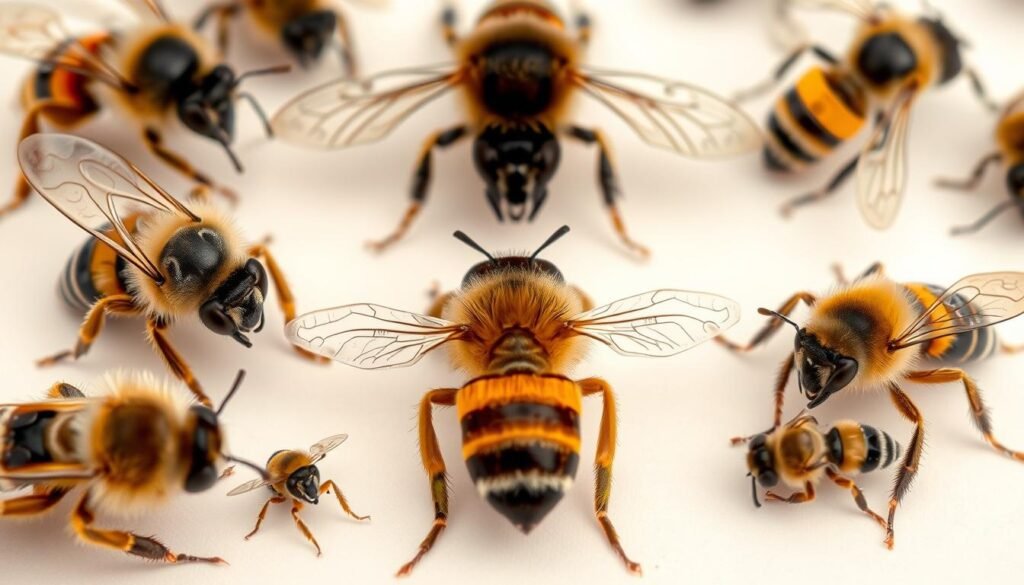
Identifying Native Bee Species
Distinctive traits help differentiate local species. Blue-banded varieties display metallic stripes, while resin bees collect plant sap for nest-building. Size variations range from 2mm stingless types to larger carpenter species.
Field guides highlight key identification markers:
- Body hair patterns affecting pollen collection
- Wing structures determining flight capabilities
- Seasonal activity peaks matching flowering cycles
Conservation Benefits and Local Impact
Protecting native pollinators strengthens food security and biodiversity. Urban gardens using endemic plants increase nesting opportunities. Reduced chemical treatments allow populations to rebound naturally.
Recent initiatives focus on:
- Creating artificial habitats using sustainable materials
- Monitoring population changes through citizen science projects
- Developing climate-resilient corridors between green spaces
These efforts help safeguard species that pollinate 90% of Western Australia’s wildflowers. Regular workshops share updated information about creating supportive environments through simple landscape changes.
Practical Guide to Beekeeping in Perth
Starting a pollinator-friendly hobby requires quality tools and local knowledge. Suppliers like Guilfoyles craft durable woodware and supers in Western Australia, offering custom designs for varied climates. Their commitment to craftsmanship ensures every piece meets strict durability standards.
Getting Started with Beekeeping
New enthusiasts need core equipment: protective suits, smokers, and hive tools. Local starter kits bundle these essentials with step-by-step guides. Many include mentorship programs to help beginners avoid common pitfalls.
| Starter Kit Features | Advanced Add-Ons |
|---|---|
| 8-frame Langstroth hive | Modular hive extensions |
| Stainless steel scraper | Hive weight sensors |
| Fuel-free smoker | Insulated winter covers |
Essential Equipment and Safety Practices
Position hive setups in shaded areas with morning sun exposure. Maintain 3m clearance from property lines to comply with council rules. Always wear sealed gloves and veiled hats during inspections.
Choose frame foundation types based on goals:
- Beeswax sheets encourage natural comb building
- Plastic frames simplify honey extraction
- Foundationless designs support organic practices
Weekly checks help spot queen health issues or pest activity. Adjust management techniques seasonally—increase ventilation in summer and reduce hive entrances during cooler months.
Exceptional Honey Varieties and Local Bee Products
Western Australia’s landscapes yield liquid gold through artisanal honey varieties shaped by seasonal blooms. From bold Redgum to delicate wildflower blends, each jar tells a story of local flora and precise harvesting techniques. Producers like The House of Honey use QR codes to reveal a product’s journey – scan the label to see which hives contributed to your breakfast toast.
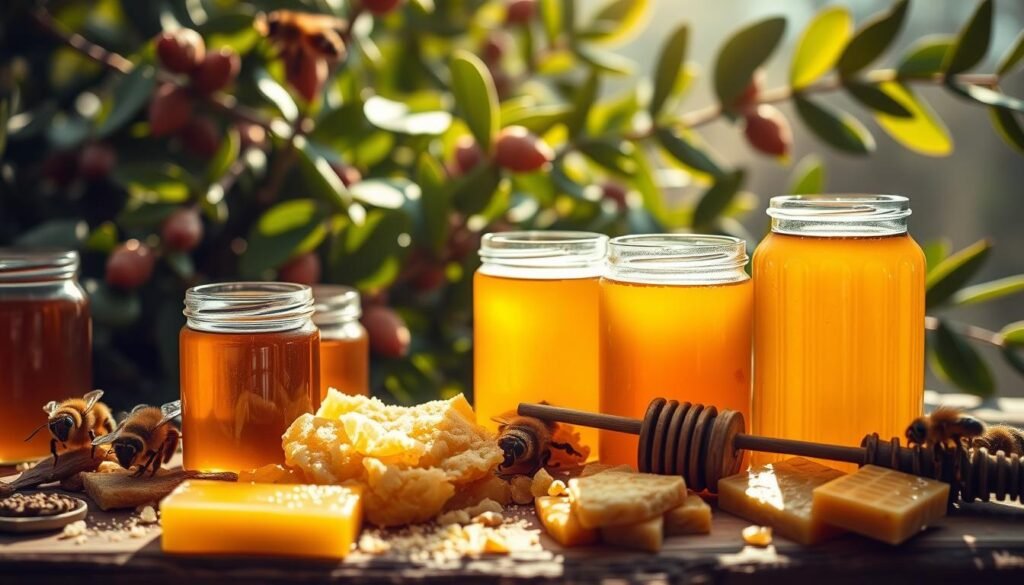
Discovering Pure, Locally Sourced Honey
Distinctive flavours emerge from specific plant sources. Jarrah honey’s amber tones carry subtle caramel notes, while Marri varieties offer lighter, floral undertones. Weather patterns create annual variations – a cool spring might intensify Banksia honey’s citrus hints.
Limited seasonal releases attract collectors. Redgum honey appears briefly when these towering trees flower, capturing their rich, earthy profile. Local markets often stock these rare batches alongside everyday favourites.
Innovative Beeswax Products and Unique Gifts
Artisans transform raw beeswax into practical luxuries. Guilfoyles crafts food-safe wraps that replace plastic, while small studios pour honey-scented candles. These items support sustainable living without compromising quality.
Creative gift sets combine edible and usable treasures:
- Mead tasting kits with native flower varieties
- Skincare bundles featuring propolis creams
- Wooden gift boxes with honey dippers and wax melts
Many products highlight First Nations collaborations, incorporating traditional knowledge into modern designs. This approach preserves cultural heritage while delivering contemporary appeal.
Beekeeping Events, Workshops and Tours
Interactive learning opportunities bring apiculture to life for enthusiasts of all ages. Local organisations host immersive programs blending education with hands-on discovery, perfect for families or curious individuals.
Community Workshops and Educational Tours
Join 45-minute sessions where protective gear transforms visitors into temporary apiarists. Guides demonstrate hive inspections while explaining colony roles – from worker tasks to queen behaviour. Participants taste fresh honey varieties and learn extraction methods using professional tools.
Virtual options replicate this experience through 360-degree hive cameras and live Q&A sessions. Seasonal programs align with floral cycles, offering timely advice on spring expansions or winter hive protection.
Private Tours of Local Bee Farms
Groups of eight or more enjoy customised itineraries focusing on specific interests like mead production or pollination science. Corporate teams often combine tours with honey-themed team-building activities, while schools integrate them into biology curricula.
Special event packages include:
- Wedding favours featuring personalised honey jars
- Behind-the-scenes access to extraction facilities
- Exclusive shop discounts on artisanal products
Advanced books secure preferred time slots, ensuring tailored attention from expert guides. Regular news updates highlight new programs, making it easy to plan return visits as skills progress.
Local Expertise: Meet the Experienced Beekeepers
Mastering apiculture requires decades of hands-on learning – a truth local specialists embody through their daily work. These guardians of pollination balance tradition with innovation, ensuring thriving ecosystems across Western Australia.
Insights from Seasoned Beekeepers
Rupert and Kim from The House of Honey showcase what 50+ years in the field achieves. Their Swan Valley sanctuary, established in 2010, demonstrates sustainable hive techniques that prioritise colony health over commercial gain. “Observing brood patterns tells you more than any textbook,” Kim notes, emphasising their observational approach.
Industry leaders like Beewise refine their craft through specialised breeding programs. Six decades of experience have produced queen strains with enhanced foraging skills and disease resistance. These traits prove vital for urban setups and commercial operations alike.
Key lessons from local experts include:
- Adapting hive inspections to seasonal nectar flows
- Identifying early signs of pest infestations
- Matching bee genetics to specific environments
Mentorship programs bridge generational knowledge gaps, pairing newcomers with veterans. This exchange preserves traditional methods while integrating modern solutions like climate-resilient hive designs. Regular workshops ensure these insights remain accessible to all skill levels.
Comprehensive Information on Bee Equipment and Supplies
Local artisans craft durable tools tailored to Western Australia’s unique climate. Suppliers like Guilfoyles manufacture woodware and hive components using regionally sourced materials. Their workshops transform raw beeswax into foundation sheets and specialty products, supporting sustainable practices from hive to shop.
Quality, Locally Manufactured Equipment
Western Australian providers deliver solutions matching diverse needs:
- Custom designs for urban spaces or commercial operations
- Beeswax processed into blocks and rolls for comb-building
- Modular hive systems with climate-adapted ventilation
Beewise’s equipment ranges suit beginners and professionals. Their quality guarantees cover materials and craftsmanship. Staff help select tools through in-shop consultations or online guides.
Key advantages include:
- Rapid delivery of locally stocked essentials
- Reduced environmental impact through regional sourcing
- Wax recycling programs maintaining product traceability
Shops bundle protective gear with hive tools, offering complete starter kits. Bulk orders receive discounted rates, making commercial setups cost-effective. Custom requests require minimum quantities but enable tailored solutions for unique challenges.
Conclusion
From hive to home, the region’s dedication to quality and sustainability shines through every product and program. Local artisans transform raw materials into premium bee-friendly goods like beeswax wraps and seasonal honey varieties. These items support eco-friendly living while celebrating nature’s hardest workers.
Educational books and workshops equip enthusiasts with time-efficient methods for hive care. Suppliers provide ethically sourced equipment, helping bee colonies thrive in diverse environments. Regular news updates keep communities informed about new gift ideas and food pairings featuring local liquid gold.
Every purchase or hands-on experience strengthens conservation foundations. Whether exploring candle-making or tasting rare honey types, participation fosters deeper environmental connections. This collective effort ensures future generations inherit thriving ecosystems rich in biodiversity.


